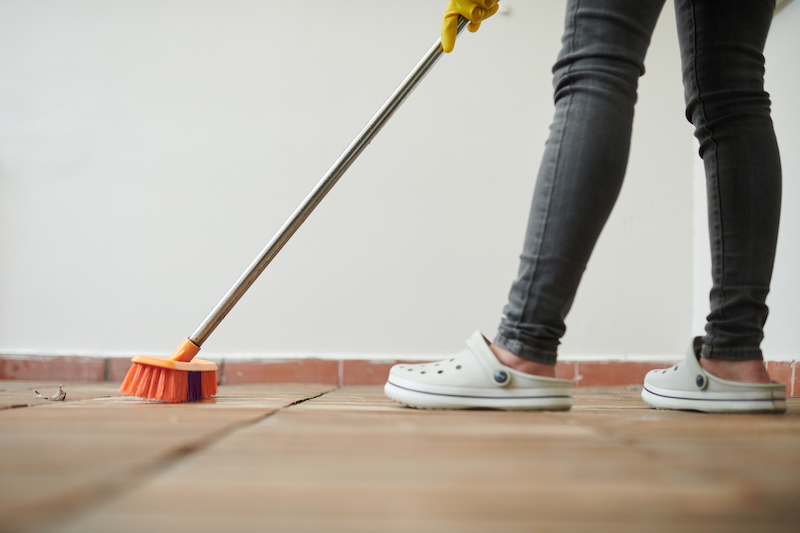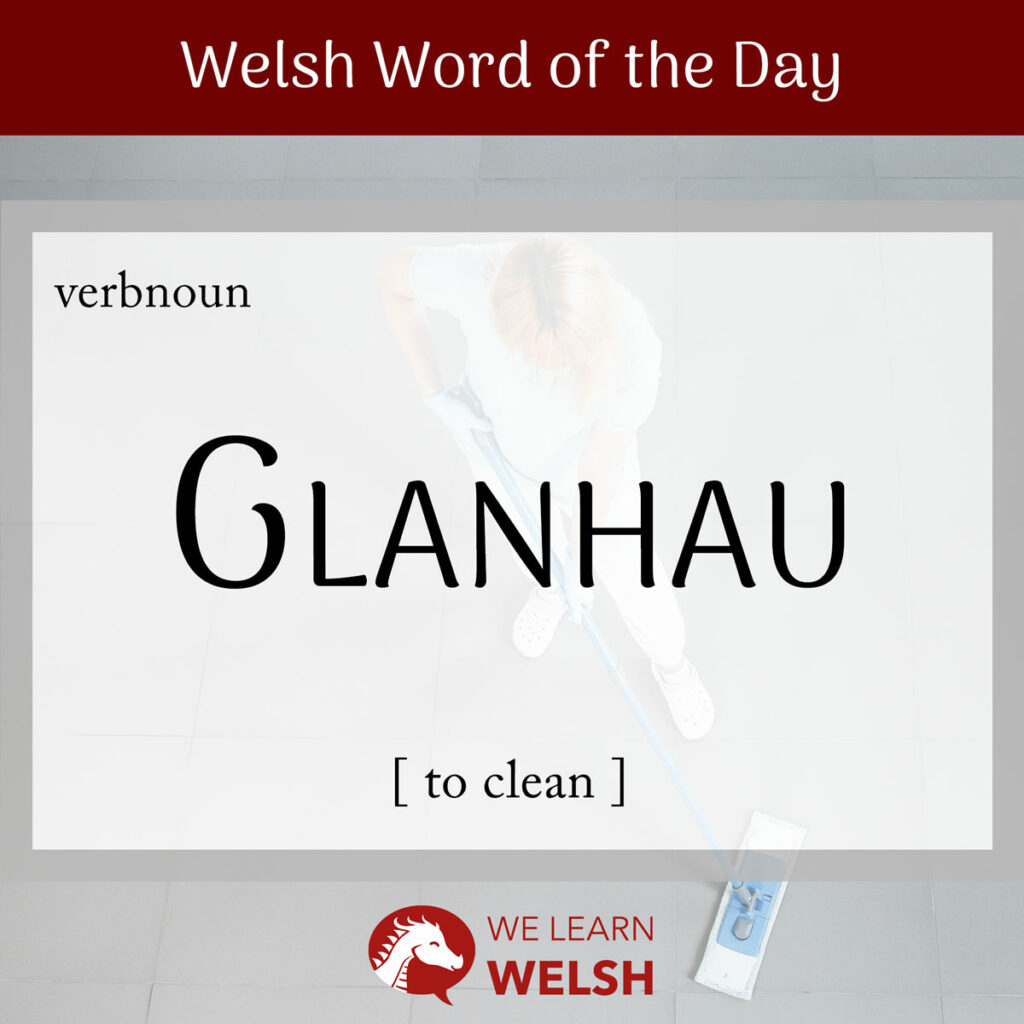If you asked any of my friends what their least favorite household chore is, I can almost guarantee they’d say taking out the biniau (bins). Personally, I don’t mind that one as much. Unfortunately, the one I dislike the most is something you have to do constantly – glanhau (cleaning) – which has never been my favourite!
glanhau
to clean
It has to be done no matter what, though, because, rather intuitively, glanhau is essential to keep things glân (clean). And as much as I hate glanhau, I don’t hate it as much living somewhere budr (unclean).
In fact, glanhau actually comes from the word glân, which evolved from the proto-Celtic *glanos meaning clean or clear. The suffix –hau or –au is used in Welsh to turn adjectives into verbs. Other examples include cryfhau (to strengthen) from cryf (strong) and llacau (to loosen) from llac (loose).
Here is how glanhau responds to mutations:
Soft mutation
lanhau
Nasal mutation
nglanhau
Aspirate mutation
N/A
The nasal mutation isn’t common here, though. It would only turn up if you said fy nglanhau (to clean myself) which isn’t a very natural thing to say. It would make more sense to say ymolchi, which is a reflexive version of golchi (to wash), used when you’re talking about washing yourself or another person, rather than an inanimate object.
An exception is when we’re talking about dannedd (teeth). In English, we don’t wash our teeth, we brush them. In Welsh, we don’t wash them either, we clean them – glanhau dannedd. And brwsio dannedd, a direct translation of brushing teeth, is becoming more common these days too.
Very occasionally, and only in the most formal or literary of contexts, the word glanweithio might turn up instead of glanhau. This is a merge of the word glanhau with gweithio (to work or to do).
But what’s much more relevant is that in both North and South Wales, there are shortened colloquial versions of glanhau which are common in everyday speech. It’s worth being aware of these in case people use them around you. So, in the North, listen out for llnau, and in the South, remember you might hear clau.
The words for clean, as in the noun a clean, follow a similar pattern. The root word is glanhad, but in the North this is often shortened to llneuad and in the South to cleuad. In the North-East specifically, the pattern is broken and the slang word of choice is cnâd. All of these are masculine nouns.
Rho cleuad i’r gegin, ‘nei di?
Give the kitchen a clean, will you?

Like the English clean, there are a couple of non-literal usages for glanhau. One of the most common is to prepare food, particularly meat, for eating. So glanhau pysgodyn (cleaning a fish) would refer to throwing out bones and other inedible parts. Another example, which has fallen out of fashion in colloquial speech, is the synonym of difeio (exculpate).
On a larger scale, governments and other organisations may undertake the glanhau of natural environments in order to protect and maintain them.
The conjugations of glanhau are regular – the same suffixes are added in the same contexts as for most other Welsh verbs. You just have to change the hau element to heu and then add a bit on at the end. But here’s a table to help you out. 😊
| Future | Conditional | Past | |
| First person singular | Glanheua(f) i I will clean | Glanheuwn i I would clean | Glanheuais i I cleaned |
| First person plural | Glanheuwn ni We will clean | Glanheuen ni We would clean | Glanheuon ni We cleaned |
| Second person singular / informal | Glanheui di You will clean | Glanheuet ti You would clean | Glanheuaist ti You cleaned |
| Second person plural / formal | Glanheuwch chi You will clean | Glanheuech chi You would clean | Glanheuoch chi You cleaned |
| Third person singular | Glanheuith / Glanheuiff fo/fe/hi He/she will clean | Glanheu(s)ai fo/fe/hi He/she would clean | Glanheuodd fo/fe/hi He/she cleaned |
| Third person plural | Glanheuan nhw They will clean | Glanheuen nhw They would clean | Glanheuon nhw They cleaned |
Glanhau is necessary to maintain glanweithdra (hygiene / cleanliness), which is an important part of general iechyd (health), and also diogelwch (safety). But it’s also used to make things look nice and taclus (tidy). In the house, some of the most common and important types of daily cleaning include:
- ysgubo (sweeping / mopping)
- hwfro (hoovering)
- dwstio / tynnu llwch (dusting)
- glanhau’r arwynebau (cleaning the surfaces)
- glanhau’r tŷ bach (cleaning the toilet / bathroom)
- golchi llestri (washing up)
- golchi dillad (laundry)
There are some nice slang-y words, too, for giving something a quick once-over of a clean. Stricad is the word of choice in the South, as in rhoi stricad i’r tŷ bach (to give the loo a quick clean), and in the North you’d be more likely to hear a version of sglempen, slempen, or sglemp.
Roedd rhaid i fi lanhau’r llawr ar ôl i ti ‘neud e mor fwdlyd.
I had to clean the floor after you made it so muddy.
In English, we often talk about spring cleaning. The term of choice is glanhau blynyddol (yearly cleaning), though more often people will just talk about doing a glanhad llwyr (full clean) or use the jocular sbring–clinio. So, in Welsh, the term is less specific, although it still only seems to be done once a year!

